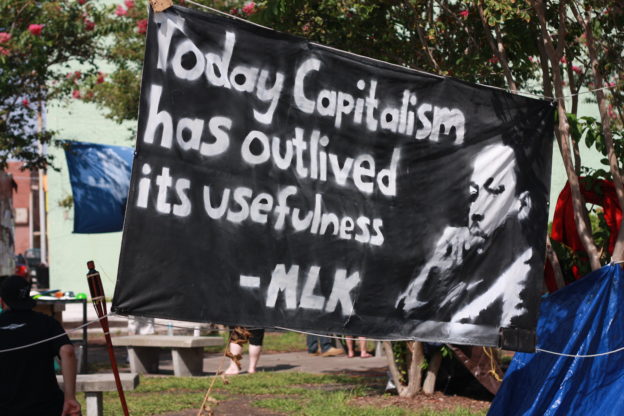In the introduction of Franchise, Marcia Chatelain uses the tagline “From Sit-In to Drive-Thru” to illustrate how fast-food restaurant franchises such as McDonald’s have been central to black capitalism in the United States since the 1960s. Chatelain suggests that black capitalism is “[t]he notion that black liberation can come through black control of the means of production and access to consumption” (16). She further explains that black-owned restaurants use “the language of black capitalism to convince blacks that patronizing their respective establishments would be in the best interest of the black community at large” (20).
Chatelain opens this chapter with the sit-in occupation of the Florissant Avenue McDonald’s as “a beacon” (4) of the black community in Ferguson, Missouri, after the shooting of Michael Brown Jr. that triggered the Movement for Black Lives. She draws our attention by putting ‘sit-in’ in the title of her introduction chapter as black capitalism shifts the term from the civil rights movement to empty consumerism. As she “tells a hidden story of the intertwined relationship between the struggle for civil rights and the expansion of the fast-food industry,” (5) Chatelain explains how black capitalism became an essential part of systemic racism in the twenty-first century United States. While healthier food selections are more accessible in white neighborhoods, the lingering impact of segregation still affects the mushrooming of black franchise businesses in black neighborhoods. These businesses leave them with little alternatives to the cheap, swiftly-prepared, but unhealthy processed hamburgers that threaten their food security and increase their risk of “obesity, diabetes, and hypertension” (8).
At the same time, Chatelain questions the exploitative nature of the franchise business model when the connection between franchisers and franchisees is an asymmetrical power relationship. In her conclusion, she suggests that all the money spent by black Americans in the spirit of solidarity on the fast-food franchise restaurants owned by fellow black Americans might just be ‘driving-through’ to white billionaires who own the mother companies of those black-owned fast-food franchise restaurants. She argues that the parent companies usually neglect black franchisees with little support. At the same time, black franchisees also struggle with high taxes and insurance costs, even though they make the most profits for their parent companies. With this in mind, Chatelain concludes that “black capitalism is incompatible with black freedom” (20) and that the problems do not originate from the individual level but the larger system.
 By Liz Mc – Flickr: ‘Today capitalism has outlived its usefulness’ MLK, CC BY 2.0, https://commons.wikimedia.org/w/index.php?curid=20987101
By Liz Mc – Flickr: ‘Today capitalism has outlived its usefulness’ MLK, CC BY 2.0, https://commons.wikimedia.org/w/index.php?curid=20987101
—
This post was peer-reviewed by Alex Hanson and Candice (Danielle) Wilfong.
